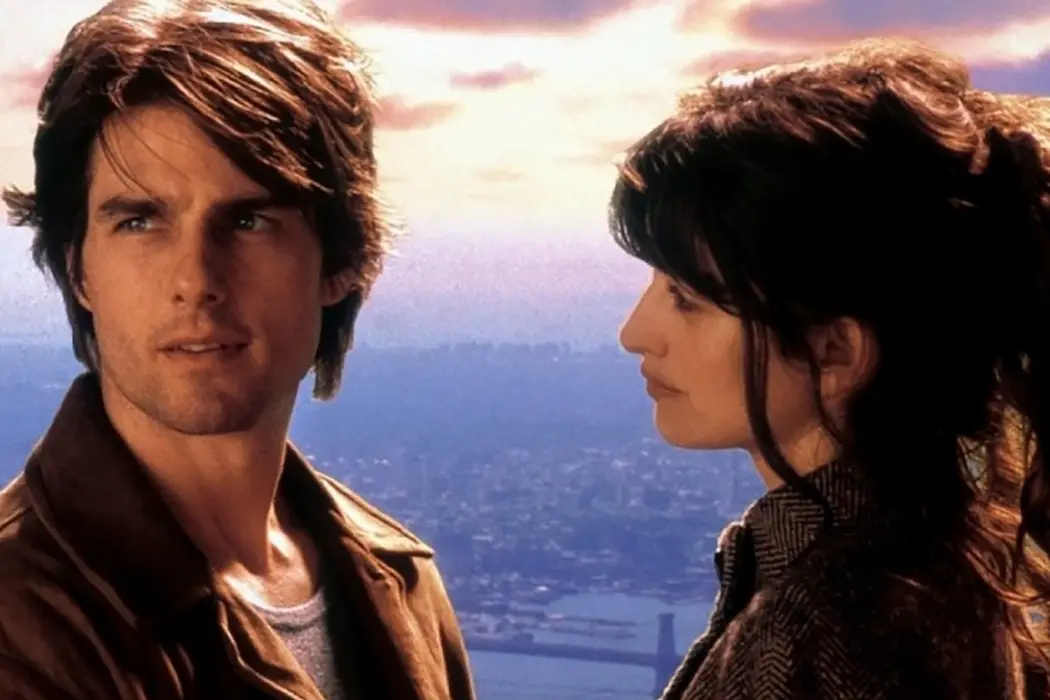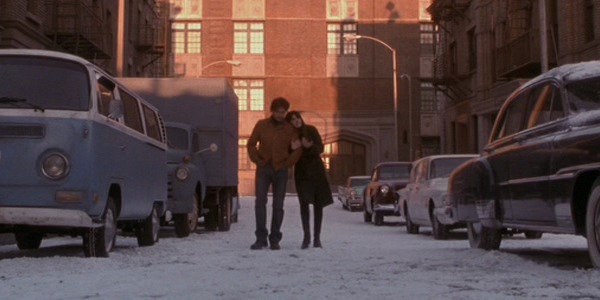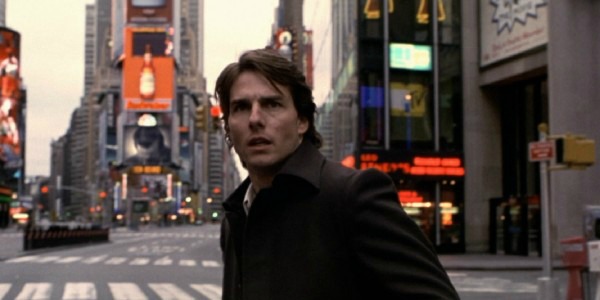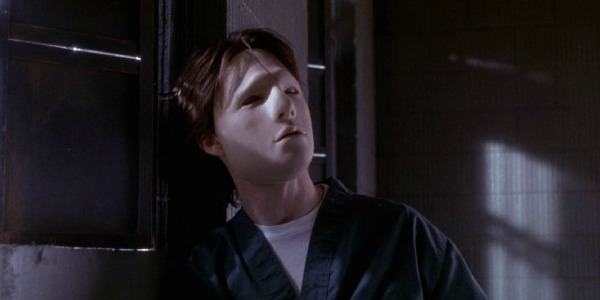Thriller In Vanilla Or Red Sky In The Morning? Crowe’s VANILLA SKY Gets The Take Two Treatment

'Books, records, films – these things matter. Call me shallow…
Welcome to Take Two, the series that is mature enough to hold up its hands and say “I was wrong.”
From your first watch to your second, has a movie gone from marvellous to meh? Has an initial viewing ever left you cold, only to later warm the c*ckles of your heart? Have you ever been so stubborn, anti-mainstream and cantankerous that you’ve point-blank refused to admit that a certain film has any merit at all whilst everyone else claims it’s the cinematic second-coming? Apologies. This is supposed to be therapeutic, not therapy.
The ideas of manipulation of memory and perception made Vanilla Sky seem like the perfect choice for a second take.
Vanilla Sky in One Take
Vanilla Sky landed during a period when I was building up a base of directors whose work I admired and actors whom I would watch regardless of what they appeared in. It seemed to me that Quentin Tarantino had lead the charge of acclaimed directors whose entire body of work you had to devour, making the director as, if not more important than the cast. Of course, this has been the case since directors began directing, but I thought myself an expert. However, I was also a lifelong music fan, and Vanilla Sky director Cameron Crowe seemed like the perfect fit to add to my list.
Crowe’s reputation was built on his well-publicised previous career as a (then) 15-year-old music journalist for Rolling Stone magazine, and his passion for music gushed into his films.

Say Anything was a film of which I was more aware through parodies and nods. Ghetto blasters being held aloft as grandiose expressions of romantic intent seemed standard alongside the trademark Cusack cool. However, Singles I was very familiar with. Or, at least, I was familiar with the soundtrack which overshadowed Vanilla Sky. It was a highly-influential compilation which became the resume of Grunge (with the exception of some little-known band called Nirvana), and was on constant repeat on any Grunge fan’s Discman. It’s also the album I first went to when I heard of Chris Cornell’s death.
Jerry Maguire had passed me by except for the repeated-ad-nauseum catchphrases, and for breaking Renee Zellweger. So what attracted me to Vanilla Sky?
The trailer intriguingly subverted the romantic drama of Jerry Maguire, spinning it into a mystery that (over) promised to question everything that we know about life, love, sex…etc. More importantly, it threatened to show Tom Cruise losing everything: money, looks, and the population of New York. Soundtracking the trailer with the sublime Solsbury Hill by Peter Gabriel sealed the deal for me.
This wasn’t the case for everyone, though. Jerry Maguire fans were turned off by the sci-fi gubbins which muddied the waters, whilst si-fi and mystery fans were turned off by the lovey-dovey stuff. I also had a hard time convincing people that Cruise was a credible actor after all of his mainstream success (ironic, I know), and although his casting no doubt detracted from any artistic or “indie” merit that Vanilla Sky laid claim to, I’d nevertheless been swung by his work in Magnolia and Eyes Wide Shut. So, ticket for one, please.
The First Take
It wasn’t a stretch to imagine Cruise as David, a multimillionaire magnate with the world at his feet, whether his casting ingenious or ingenuous was up for debate. Regardless, as memory serves, Cruise was fantastic; never more so than when his character no longer had his looks to play on. His disfigurement was genuinely shocking, and the expressionless white face mask seemed destined to become iconic.
Cameron Diaz had most recently starred in Shrek and Charlie’s Angels, and it seems fair to say she was more revered for her looks than her acting acumen. My recollection was that her performance as Julie was largely as expected. However, similarly to Cruise, it’s when it all goes south that we saw a performance worth remembering. Controlling, possessive, and ultimately scorned, it was possibly Diaz’s best offering, even if the line about swallowing seemed like a cheap pop.
As Sophia, Penelope Cruz added indie sensibilities both by being a Spanish actress moving into English language films, and by bringing the credibility of starring in the original. Alejandro Amenábar’s Open your Eyes was omitted from Vanilla Sky’s promotional trail, but for those in the know, Cruz’s involvement went some way to reduce the stigma that (even then) surrounded remakes. Her performance was the most restrained of the cast, and whilst relatable and endearing, was most accurately summarised by Julie as being moth-like.
Looking back, I had a clear emotional response to Vanilla Sky’s themes of love, memory, and the subconscious. David’s acute sense of longing for Sophia translated well, resonating with the idea of what could have been, what should have been, and what never was. As a bit of an Emo back in the day, David’s heartbreak was enough to make my eye-liner run.

I could recall stunning visuals: David running through a deserted Times Square, the David and Julie argy-bargy and resulting brutal fender bender, and David passed out in the street after losing Sophia. It always seemed like a film that was more than the sum of its parts. The soundtrack alone had me sold, blending Radiohead (whose use in any film is a rarity in itself), Todd Rundgren, and The Chemical Brothers to stunning effect.
With such fond memories, surely take two would be like reliving a dream?
Take Two
So, apparently we dream for at least two hours each night, but we can’t remember all of them. Vanilla Sky is just over two hours. Coincidence?
From the outset, the presentation of Cruise’s David seems ham-fisted and overly expositional: a clichéd rich boy playing with his inheritance; Steinway pianos and smashed classic Stratocasters decorate his apartment, and his vanity is exemplified in the discovery of a grey hair. His character is impossible to relate to, much like a display of faux-arrogance by Bruce Wayne. His cartoon character-esque room exits, sense of entitlement, and despicable treatment of Diaz’s Julie remove all embers of empathy and beg the question, “Why root for him?”
The giddy relationship between David and Sophia comes close to bringing up bile. All toothy grins and playing hard to get, sorry…“pleasure delaying”. Each is individually endearing to a point, but it’s like sitting opposite a couple who really want you to know just how in love they are through excessive PDA. Who does that?! I spent a portion of the second take thinking, is this real? Is that the twist? That this rosy, soft-focus view of courting is part of the dream? Sadly not.
The once-remarkable Times Square scene seems less impressive with hindsight, and is in retrospect surprisingly upstaged by the scenes of an abandoned Westminster in 28 Days Later. The car crash is still a striking visual, though, jolting the viewer like an airbag exploding, whilst the preceding argument scene still has bite and may just be the first use of the word Fuck Buddy (any challenges?). Once the dream kicks in, Cruise improves, the cheesiness crumbles away, and the second act finally hits its stride.
The mystery of why David is wearing the mask (if he actually needs to) and the murder victim’s identity still manage to pique curiosity the second time around, and Kurt Russell’s psychiatrist does a great job of mooring the viewer as the case unravels, asking the questions that we’re asking ourselves.

The rest of the cast do an admirable job of supporting, too. We are treated to an early appearance of Michael Shannon as the prison guard, who’s ready to break David’s face all over again, Spielberg swings by David’s party (Crowe later returned the favour by appearing in Minority Report), and The Big Bang Theory’s Leonard Hofstadter acts as the host’s aid. We also get a glimpse of Tilda Swinton before she had her teeth done.
What still remains is an inspired use of music, which depicts atmosphere and emotion more effectively than anything aesthetic. Todd Rundgren’s Can We Still Be Friends perfectly soundtracks the strangulation of Julie at the hands of David, whilst R.E.M.’s The Sweetness Follows conjures a sadness that the story doesn’t quite evoke itself. At times, though, the song selection seems like a Sixth Former’s Media Studies project: Jeff Buckley’s Last Goodbye seems far too literal to be effective as David leaves Sophia’s apartment for what ends up being the last time. While Radiohead’s Everything In Its Right Place sums up David’s life perfectly, with his immaculate condo, tousled fringe, and effortless abs, it leaves no dots un-joined.
Where Sophia and Julie merge and intertwine makes another impressive visual (do you sense a theme here?), and David’s memories being inspired by/reenactments of album covers is a masterstroke that makes you hit rewind for another look. The most valuable thing I took from the second take was the metaphor; “My Favourite Beatle was once John and now, it’s Paul” which although not quite true for me, is relatable enough to sting a little.
The climax is still wholly unsatisfactory, regardless of whether you’re a pleasure delayer or not. Noah Taylor appears as Basil Exposition Mark two to explain away David’s suicide, hibernation, and dream reanimation. Even a synthesised reunion with Sophia leaves the viewer limp. David’s dive from the virtual skyscraper sets David on a path to make new memories, but only serves to remind you that you watched it all for nothing, and you’re left waiting for the splat.
Final Cut
I was always aware that there was something missing with Vanilla Sky. Far from perfect, Crowe‘s music video history seemed to have created a series of moments rather than an actual movie, and whilst I’ll always have a soft spot for it, it doesn’t deserves a take three. I hope I remember that next time around.
Which films do you think deserve a Take Two? Let us know which and why in the comments and see if you can change our mind.
Does content like this matter to you?
Become a Member and support film journalism. Unlock access to all of Film Inquiry`s great articles. Join a community of like-minded readers who are passionate about cinema - get access to our private members Network, give back to independent filmmakers, and more.
'Books, records, films – these things matter. Call me shallow but it’s the f*****n’ truth.' Freelance writer, amateur musician, professional misanthrope. https://redbezzlebrand.wordpress.com/













